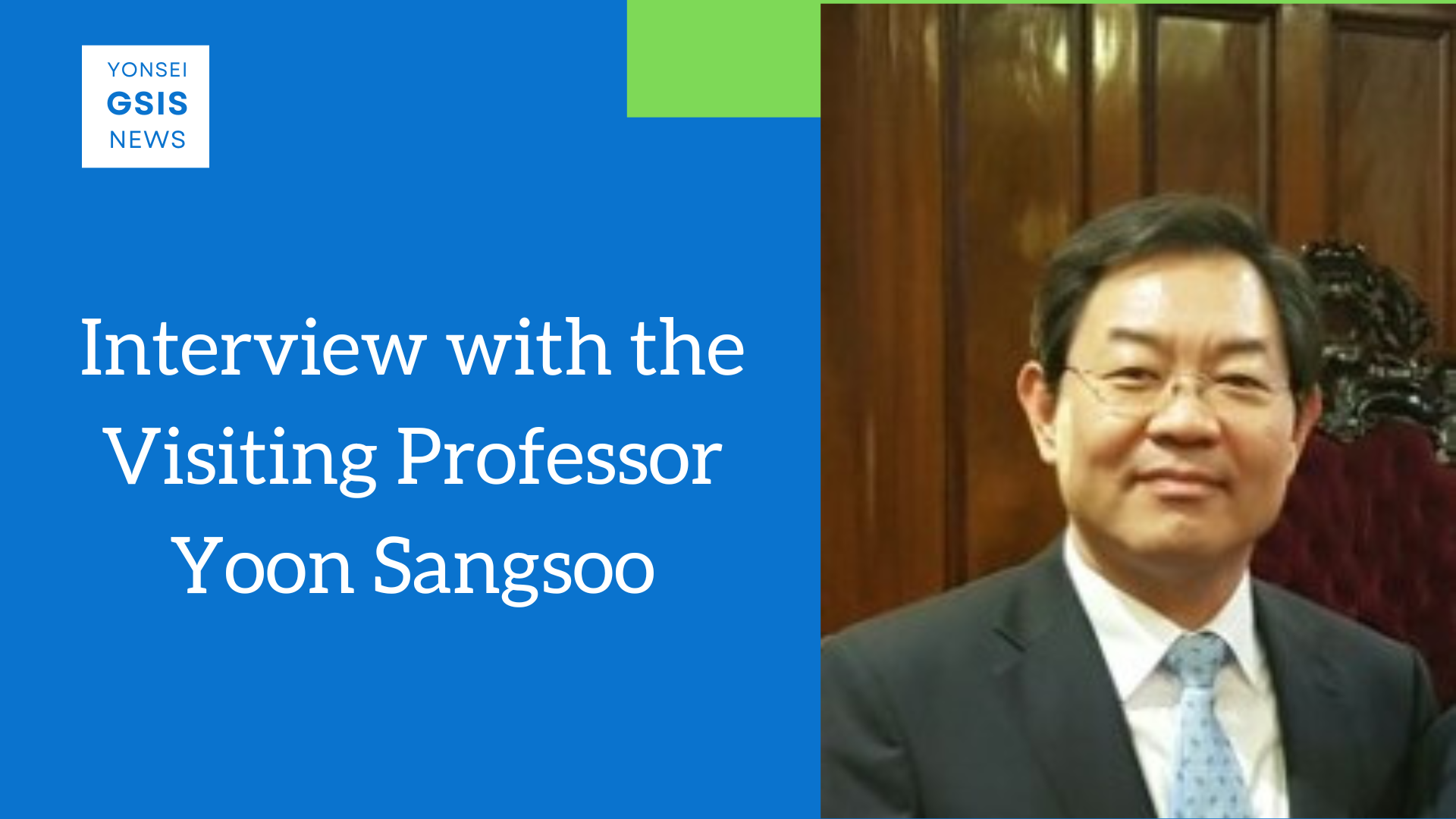- 제목
- [Newsletter] An Insightful Journey with Professor Yoon Sangsoo on International Trade, Diplomacy, and Education
- 작성일
- 2024.10.29
- 작성자
- 국제학대학원
- 게시글 내용
-

By Mishra Shreya
Senior Editor, Yonsei GSIS Newsletter
As the US-China Trade War intensifies with no clear resolution in sight, students are increasingly curious about the origins, repercussions, and potential solutions to this multifaceted crisis. A related topic of interest is the role of international trade institutions, particularly the World Trade Organization (WTO), in navigating such conflicts. In response to this growing curiosity, the GSIS Newsletter had the privilege of interviewing Professor Yoon Sangsoo, a Visiting Professor of International Trade Law and Diplomacy. With extensive experience in various national and international economic forums, including the WTO, Professor Yoon provided valuable insights into the complexities of global trade disputes and their broader implications.
I heard that you have taken up the job of being a professor at any school for the first time. Could you please encapsulate how you feel, for our readers? How did you overcome the dilemma of joining academic life as a professional?
It is really my pleasure to join Yonsei GSIS as a visiting professor and to have an opportunity to share my experience and know-how on trade law and diplomacy. It also gives me joy to meet many graduate students who have diverse backgrounds and nationality in the class. From my diplomatic background, it seems to me somewhat natural to be a lecturer after retiring from the Korean Foreign Ministry, serving for more than 35 years. For me, it is now time to change the course of my life and it would be my wish to work as a professor at the most prestigious university in Korea with bright young students.
Could you talk briefly about your professional journey until now?
I started my career at the Office of Prime Minister as a policy coordinator after passing the Korean government high public service exam in 1988. At the Prime Minister’s office, I was involved in many reform agenda at that time including War on Crime, Globalization Policy, Trade Liberalization, Inter-Korea Sunshine Policy and Reorganization of Ministries.
After studying international trade law at Georgetown University Law Center between 1994 and 1996, I decided to move on to the Ministry of Foreign Affairs and Trade, which was newly established to push forward trade liberalization in 1998. There, I had been heavily involved in the negotiation in the World Trade Organization and my first post overseas was the Korean Mission in Geneva. I had worked for more than 10 WTO disputes cases that Korea engaged as a disputing party during my service in headquarters and in Geneva.
I also became Director of the Economic Cooperation Division in the Ministry in charge of bilateral economic agreements on various areas including aviation, maritime, investment and science/energy. I also served as Head of the Korean delegation in the Non-Market negotiation group in Doha Round Negotiation and Head of the Korean WTO dispute team in 2010 and 2011.
As a leadership role, I served as Consul-General of the Republic of Korea, at first in Sydney, Australia and then in San Francisco, the USA. Through these services as Head of mission, I had the opportunity to make contributions to strengthen bilateral relationships and promote trade and investment between our two countries.
What have been the highest and lowest times of your career? How do you overcome the challenges you face in your professional life?
My intention to move on to the Foreign Ministry was to practice the international trade law that I learn from the schools. In a sense, I accomplished my goal to become a leading official and lawyer in the WTO proceedings and outcomes in my cases were quite successful. It was really enjoyable for me to visit or serve in Geneva and engage in the WTO process.
Being a successful diplomat in the Foreign Ministry was not an easy job to an official like me who has a different background and comes from another Ministry. I do not think I overcame career challenges successfully from the perspective of my family and friends, but I do believe that I did my best in the process and I do not complain about my choice.
What advice would you give to students seeking to pursue diplomacy? Is it necessary for them to pass certain examinations to become diplomats in international organizations?
It is not easy to become a diplomat in the Foreign MInistry or international organizations due to the entrance barrier such as very competitive exams and a very limited number of newcomers. You need a concrete plan to get in and work hard in order to compete with others. Way of becoming a diplomat differs depending on each national scheme. One thing I would like to say is that once you get in, you have a lot of good opportunities to engage in international affairs. So be patient, work hard and pursue your dream.
What is the one thing that keeps you going in your professional life as a diplomat and a professor?
When I was a boy scout member in primary school, one motto I remember now was ‘be ready’. If you are ready enough to do something, you would not be in a panic, rather be in a good shape to excel in the real situation.
Any final words for your students or readers?
I congratulate you on being a Yonsei GSIS student and I believe that your academic journey here will be worthy and memorable to your life.

